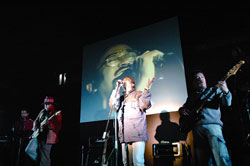 Conflict is the last theme that most Nepali musicians would choose to sing about, for both commercial and political reasons. And making music about a real incident that implicated both the security forces and Maoists in the killings of civilians is virtually out of the question.
Conflict is the last theme that most Nepali musicians would choose to sing about, for both commercial and political reasons. And making music about a real incident that implicated both the security forces and Maoists in the killings of civilians is virtually out of the question. But as usual, folk-rock fusionist Amrit Gurung and his band Nepathaya have taken their own path away from mainstream Nepali music with their latest album Ghatana, an indictment of the conflict and its fighters. Released before Dasain, Ghatana is still not a chart-topper and perhaps will never sell like the band's previous CDs. But Nepathya's aim in doing the recording, according to its promoter Nepa-laya, is a social one: to jolt many Nepalis into seeing the bitter reality that most of their countrymen and women are living in.
Delivered with heart-rending lyrics, a heavy metallic sound and angry vocals, Ghatana scorns the violence of a fruitless conflict that has dragged on for nearly a decade and whose victims have been mostly civilians caught in the middle of gun-toting security forces and Maoist militants.
The first song, 24-minute Ghatana, spotlights the May 2004 incident in Dholka's Mainapokhari, where Maoists ambushed a public bus because it was carrying soldiers, killing six civilians. Ridiculing both the rebels and security forces for jeopardising the lives of innocent men and women, the song was expected to be banned, especially at a time when the state was censoring any criticism of security forces. But Gurung and his band performed Ghatana live at Maiti Ghar Shanti Mandala on 15 December.
Another tune, Kata lagyo, asks villagers forced to flee their homes to ask both warring parties what they have gained so far from the bloody conflict. The song brought tears to the eyes of a group of conflict-affected women and children taking refuge at Maiti Nepal, where the band played live last month.
While Ghatana's powerful message is sure to touch listeners' hearts, one thing that might put some people off is the CD's heavy metal sound, which can get tiring for those used to the easy listening. But people living in conflict zones might actually feel the tension of daily life in the loud, angry beats.
Ghatana may not excite the music market but it touches the hearts of Nepalis and by doing so could prove that singing for peace is also a powerful force.
Naresh Newar


